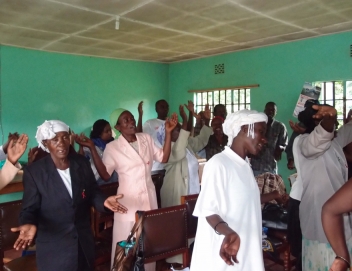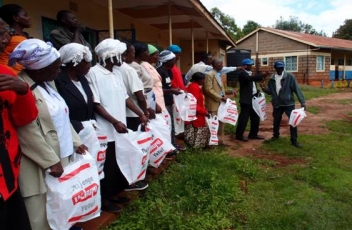 This year we marked World AIDS Day by visiting a group called “Positive Living” who are based in Misyani in the eastern province of Kenya.
This year we marked World AIDS Day by visiting a group called “Positive Living” who are based in Misyani in the eastern province of Kenya.
The group was created in 2008 and is made up of about 35 members who are living with HIV. The aim of the group is to eradicate the stigma of HIV and AIDS in the region.
The fear of stigma
The key aim of the visit was to spend time with the group and learn more about the issues they face as people living with HIV.
During the focus group discussions we discovered that people being open about their status is still a big problem. Because they are scared of being stigmatised, some members of the community choose not to disclose their HIV status. Unfortunately, this makes it difficult for them to get medical assistance.
In some cases, when a husband dies, the widow is chased away from the village for fear of infecting the rest of the community. There is still lack of knowledge on HIV and AIDS and there is a great need to promote education on home-based care giving.
Challenges faced by older people
Other challenges that older people face when living with HIV and AIDS include:
- Reduced ability to do physical labour
- Access and availability of drugs
- Lack of food (especially during the drought period)
- Access to clean water; boreholes that are accessible for older people are desperately needed
- Lack of income
- Discrimination and neglect from the rest of the community
- Long distances and waiting time to access medical assistance
- Susceptibility to other diseases
Thanks to HelpAge staff and others, including Uchumi Supermarket Sarit, we raised enough funds to buy food that we donated to the group.
The visit was also a good sharing opportunity, as HelpAge staff were lucky enough to listen to personal experiences from the group. We were also entertained by plays and poems about HIV. All in all, the team did a good job of coordinating the day’s activities.
Sustainable living
 We also (with the help of Mr Edward Nyaga of Aquaponics East Africa) gave the group a demonstration on “gunia farming”, a technique that involves planting food in sacks, which can help provide more food for a longer period.
We also (with the help of Mr Edward Nyaga of Aquaponics East Africa) gave the group a demonstration on “gunia farming”, a technique that involves planting food in sacks, which can help provide more food for a longer period.
The technique does not require a lot of water and is easy to maintain. We provided the group with several sacks for planting and seeds with nutritional value for people living with HIV and AIDS such as amaranth, wheat grass, beetroot and carrots.
The tutorial proved useful as most members participated and asked lots of questions.
Food is scarce
To earn a living, the group grows coffee and maize. There is a misconception that agriculture fares well in the region, however. Food is still very much a scarce resource. Apart from those with small farms or cattle, people survive on distributions or have to ask for food from neighbours.
Other than farming, the group takes part in many other activities, including:
- Providing education on HIV and AIDS and home-based care
- Raising awareness of HIV and AIDS to remove the stigma
- Visiting each other for moral support
The Misyani group and HelpAge staff agreed that this collaboration and learning between the two groups should continue in years to come.
The day ended by a distribution of food items to each group member and a song and dance. We also had a scrumptious lunch that was prepared by some of the ladies in the community.
The whole day was thoroughly enjoyable but also made us realise the daily challenges the older people living here with HIV and AIDS face.
Read more about our work on older people and HIV and AIDS.
